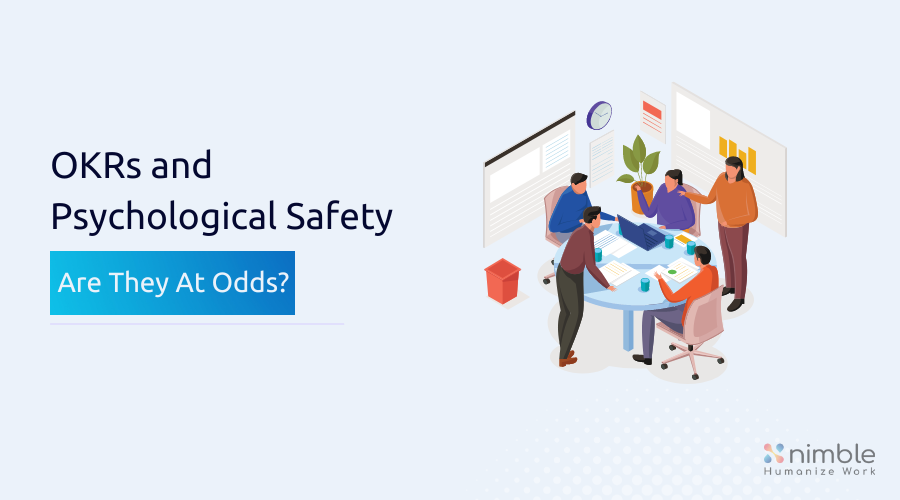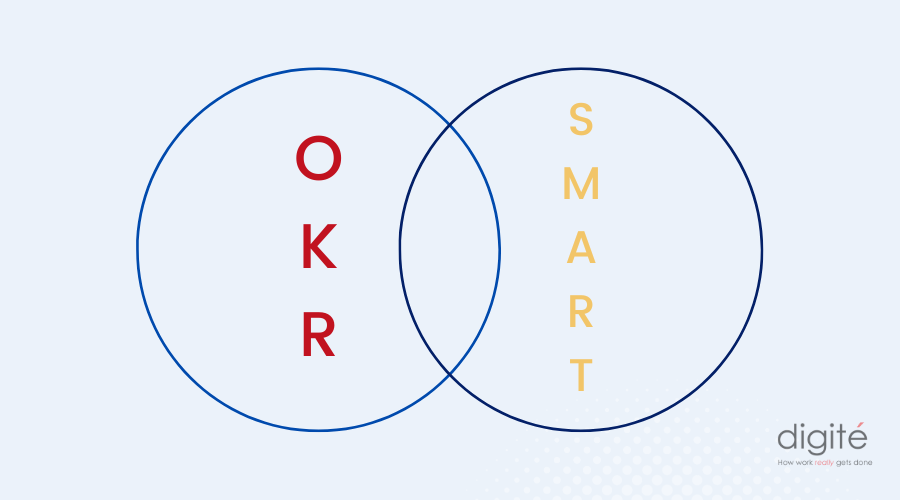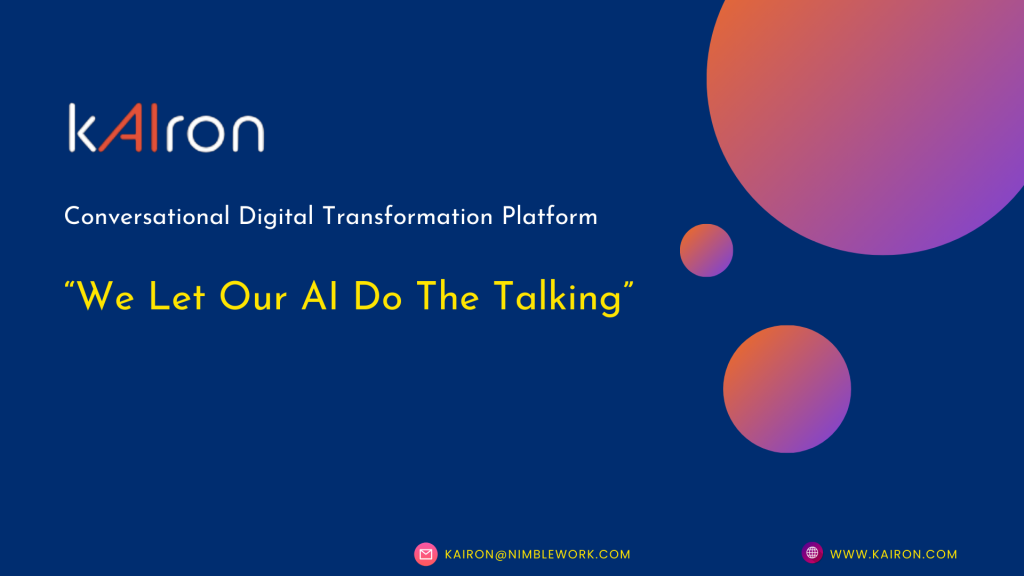OKRs vs. KPIs: Navigating the Metrics Maze – Differences, Examples, and Real-World Applications
Explore OKRs vs. KPIs: Uncover differences, examples, and real-world insights. Elevate your goal-setting and performance measurement strategies.
_____________________
_____________________

OKR targets and psychological safety.
It feels like a contradiction in terms.
If you’re doing your OKRs right, you can’t achieve their targets. And that’s intentional.
But the idea is that you still strive to get as far as you can.
And that creates tension.
About what to do and how hard to push.
Everyone has different ideas about what is enough, what is sustainable.
Irritations mount and tempers flare.
You know full well that the secret to getting as close to your OKR targets as you can is to create psychological safety for and within your team.
You’re just not sure how to go about creating psychological safety in a pressure cooker.
So let’s lay it out.
And let’s start with laying some groundwork about psychological safety and about OKRs and their targets.

Psychological safety is the belief that you are free to express your thoughts, opinions, questions, and concerns without fear of negative consequences. This feeling of safety is what enables you to function at their best.
In the workplace, people who feel psychologically safe are more likely to take risks, ask questions, engage with fellow team members, and generally speak up.
There are a number of benefits to a psychologically safe workplace. Some examples include:
You need all that if your work involves any creativity, innovation, and responding to changes.
Psychological safety also has to do with results. More specifically, with a lack of them.
When targets are achieved, most teams will celebrate them. But what happens when they aren’t achieved?
That brings us to OKRs and their insistence on unreachable stretch goals.
Objectives and Key Results, often referred to as OKRs, is a framework for aligning an organization and getting everyone, at every level, pulling in the same direction.
When you adopt OKRs, you start with setting the overall objectives at the organizational level. Every business unit, function, department, etc. then decides how to translate these into objectives specific to them. And so it goes on for every level down to that of teams.
Objectives are high level goals and often quite vague and abstract.
That’s okay because they’re not meant to be measured directly. They’re meant to inform and guide the objectives set throughout the organization.
Measuring progress is what the key results are for. They’re the concrete indicators, the things you can measure, to tell you whether your actions are moving you in the intended direction.
OKR targets are the values you want the key results to reach. They’re your concrete goals.
Contrary to SMART goals, OKR targets are intentionally set out of reach.

The idea is that they’ll motivate teams (departments, business units, etc.) to stretch, to go beyond their perceived limitations. And that this means you’ll end up way beyond where you would if you set achievable goals.
At a glance, OKRs and psychological safety may seem to be at odds.
After all, aren’t you setting people up for failure by setting unreachable goals?
That’s why many OKR advocates tell you to aim for a 70%, or even just a 60% success rate.
To use the unreachable goal as a way to inspire people to keep going when they’d otherwise have relaxed when reaching that 60% or 70% level (the attainable goal).
So are OKRs and psychological safety at odds?
Well, in and of themselves, OKRs aren’t a detriment to a workplace’s psychological safety.
Instead, they simply put the spotlight on what’s already psychologically unsafe in an organization. Simply because people respond differently to having goals in the first place and those differences have greater impact in the pressure cooker of unreachable targets.
It bears to reiterate this.
OKRs don’t cause psychological unsafety, they highlight the toxic responses and behaviors that are already happening by turning up the pressure.
So, what do you do? How do you create and maintain the psychological safety you need to grow a high performing team that gets as close to their OKR targets as sustainably possible?
The biggest factor to consider when trying to balance OKRs and psychological safety is trust.
Only with mutual trust between peers and among different levels and departments in an organization will everyone be able to give you their best effort and reach their full potential.
Workers need to trust that when they speak up, ask questions, raise concerns, and generally take risks, it won’t come back to haunt them.
Trust in the workplace is, in fact, not easy to come by.
In a survey done by the Harvard Business Review, more than half of the respondents answered that they did not have “a great deal of trust” in their employers. This lack of trust is even present among coworkers, as 51% didn’t feel a strong sense of trust to the people working alongside them.
Saying “Trust me” (or “you can trust me”) isn’t going to generate trust or create a psychologically safe workplace.
You can’t create or buy trust. You can’t even build it.
Trust is extended to you. It needs to grow and how it grows is affected by every interaction someone has with you or observes you having with others.
Which means that all you can do is to act — and get others to act — in a trustworthy manner.
Do that and psychological safety will follow.

To help your workers grow trust with leadership and amongst themselves and foster a psychologically safe workplace here are 6 actions you can take (and keep doing).
Trust can only be created with transparency. Only when you and your team can openly communicate with each other can there be trust among you.
Be transparent with your expectations and metrics to give your team and their teams direction and how you’ll measure their progress. The latter in particular helps teams tremendously when they’re chasing OKRs.
Aside from being transparent and communicative, also be more approachable and accessible.
One way is to adopt an Open-Door Policy.
Simply leave your door open. Only close it for private conversations — and these should be few and far between. It removes a significant barrier for everyone who wants to share their thoughts, ask questions, or simply start a discussion with you.
But don’t expect people to come through your door in droves immediately. They may think they’d be wasting your time or that they’ll face undesirable consequences for opening up.
So you’ll have to show them — again and again — it’s safe to approach you with whatever is on their minds by responding with sincere curiosity.
In the phygital workplace, consider using various digital platforms for conversations. Mail, email, phone, team chat, etc. are all fair game.
Also consider a platform which allows people to share their experiences and thoughts anonymously and thus in complete safety. If it works for the likes of IBM, chances are you’ll benefit from it as well.
The invaluable advantage of anonymous employee listening platforms, like Harkn, is that you’ll hear the full, unabridged, and unfiltered truth about what’s going on in your organization and team — long before you would through more conventional channels.
Everybody makes mistakes, but no one wants to look incompetent.
Yet it’s vital to be frank about mistakes so everyone can learn from them.
This is especially important when OKRs are in play with their inherently unachievable targets.
You need people to feel free to try things to reach them anyway and to adapt when they prove less than effective.
Promote accountability by showing the way:
Acting in this manner goes a long way to creating psychological safety for everyone around you, because it specifically shows that “failure”, while ideally avoided, is something to be learned from.
It also avoids wasting time playing the blame game which only serves to destroy trust and keep people from connecting, communicating, and collaborating — everything you need for a high performance team that can get close to their OKR targets.
Another reason people tend to avoid accountability is that they fear negative consequences, such as being ridiculed or being denied raises and promotions.
Again, adopting OKRs means living with never reaching your OKR targets.
Saying that reaching 70% (or 60%) is okay, doesn’t fully negate the psychological effects — at least not for all.
So, reframe failure.
Not reaching OKR targets, or even the lower level you’re aiming at, is not a failure.
Failure is not trying.
Failure is not getting up after a fall.
Failure is seeking someone to blame.
When your people feel comfortable raising their hands and do so often — in meetings and throughout the day, that’s a good sign of having a safe workplace.
However, if only some people speak up and others keep their mouths shut, it’s crucial to find out why. Your less outspoken team members may have something valuable to say, but may not feel comfortable sharing them.
And their tight-lippedness may keep you from closing in on your OKR targets.
One practice you can try is to have a dedicated portion during meetings where people can raise questions, concerns, and suggestions. Execute it round-robin fashion and clamp down on inappropriate, even toxic, responses with a simple “that’s not how we treat each other here.”
Another method is to talk to your team members outside of meetings, as some people may feel more comfortable sharing their suggestions during one-on-one conversations rather than in front of multiple people. Be sure to credit them for their ideas when you share them with the rest of your team.
Listening is important, but it’s perhaps more important to ensure people feel listened to.
Small gestures, like a simple but genuine “thank you for sharing” or asking a follow-up question, go a long way towards that and encourage everyone to speak up in future.
You’ve certainly heard about the need to celebrate wins, however tiny.
One little secret you may be less familiar with is that it pays to celebrate, or acknowledge, more than wins.
Acknowledgement boosts engagement.
And it pays to acknowledge effort, even if it didn’t lead to the desired result.
There’s always something to be learned. Like Thomas Edison said: “I haven’t failed, I’ve found a 1000 ways that don’t work.”
But don’t go off the deep end and into cheerleading anything and everything. That’ll come across as disingenuous and detract from a celebration for good effort that did bring in a desired result.
You may never achieve your OKRs targets.
And that’s okay.
But now you know how to make your environment more psychologically safe for everyone around you.
And that’s a crucial step in creating the culture that’ll allow you to get as close to those targets as is possible.
It also pays to invest in the tools to define and track them for everyone to see and to keep them fresh in everyone’s mind as they go about their daily tasks.
So, do be sure to check out Nimble OKR and Slack OKRs.
Nimble OKRS helps you define OKRs at every level in your organization, and makes tracking your progress easier than you can imagine.
If you’re already using Slack, then Slack OKRs is a perfect addition (even without Nimble OKRs — though that would make me sad) to encourage people to collaborate and course correct towards their OKRs as they go about their business.
OKRs 101
OKRs vs. KPIs: Navigating the Metrics Maze – Differences, Examples, and Real-World Applications
Explore OKRs vs. KPIs: Uncover differences, examples, and real-world insights. Elevate your goal-setting and performance measurement strategies.
What is an OKR goal? What is an OKR objective?
Implementing OKRs can be a great way for organizations to create organization-wide goals that keep motivation and alignment high, and in this post, you’ll learn more about this framework.
Tracking OKRs: Where the Real OKR Magic Happens
Implementing OKRs: 11 Do’s and 8 Don’ts for OKR Success
OKR Implementation Guide: 8 Tips to Ace Your OKRs
OKR Targets and Psychological Safety: At Odds or a Match Made in Heaven
SMART Goals or OKRs Targets for Motivational Power?
Join 150,000+ Pioneers, Leaders & Mavericks receiving our updates!

